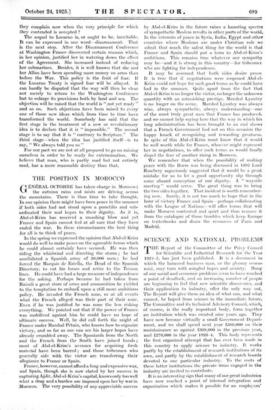THE POSITION IN MOROCCO
GENRRAL OCTOBRE has taken charge in Morocco ; the autumn rains and mists are driving across the mountains. There is thus time to take thought. In our opinion there might have been peace in the summer if both sides had not stood upon a punctilio and sub- ordinated their real hopes to their dignity. As it is, Abd-el-Krim has received a smashing blow and yet France and Spain cannot feel at all sure that they have ended the war. In these circumstances the best thing for all is to think of peace.
In the spring we expressed the opinion that Abd-el-Krim would do well to make peace on the agreeable terms which he could almost certainly have secured. He was then 'riding the whirlwind and directing the storm ; he had annihilated a Spanish army of 20,000 men ; he had forced the Marquis de Estella, the Head of the Spanish Directory, to cut his losses and retire to the Tetuan lines. He could have had a large measure ormdependence for the asking. Perhaps because he had taken from Raisuli a great store of arms and ammunition he yielded to the temptation to embark upon a still more ambitious policy. He invaded the French zone, or at all events what the French alleged was their part of their zone. Even if he was justified he was none the less risking everything. We pointed out that if the power of France was mobilized against him he could have no hope of ultimate success. Well, he did call forth the might of France under Marshal Main, who knows how to organize victory, and so far as one can see his larger hopes have already crumbled away. The Spaniards from the North and the French from the South have joined hands ; most of Abd-el-Krim's avenues for acquiring fresh material have been barred ; and those tribesmen who generally side with the victor are transferring their allegiance to France or Spain.
France, however, cannot afford a long and expensive war, and Spain, though she is now elated by her success in capturing Ajdir, Abd-el-Krim's capital, knows only too well what a drag and a burden are imposed upon her by war in Morocco. The very possibility of any appreciable success by Abd-el-Krim in the future raises a haunting spectre of syMpathetic Moslem revolts in other parts of the world. In the interests of peace in Syria, India, Egypt and other countries where Moslems are under Christian rule we admit that much the safest thing for the world is that France and Spain should put a term to Abd-el-Krim's ambitions. This remains true whatever our sympathy may be—and it is strong in this country—for tribesmen who are fighting for independence.
It may be assumed that both sides desire peace, It is true that if negotiations were reopened Abd-el- Krim could not hope for such good terms as he could have had in the summer. Quite apart from the fact that Abd-el-Krim is no longer the victor, no longer the unknown quantity with an astonishing prestige, Marshal Lyautey is no longer on the scene. Marshal Lyautey was always wise, always sympathetic, always understanding—one of the most truly great men that France has produced, and we cannot help saying here that the way in which his long administration has been brought to an end shows that a French Government had not on this occasion the happy knack of recognizing and rewarding greatness. In spite of this Abd-el-Krim must know that it would be well worth while for France, whoever might represent her in negotiations, to offer such terms as would finally dispel the fear of another rising in Morocco.
We remember that when the possibility of making peace with the Boers was being discussed in 1902 Lord Rosebery sagaciously suggested that it would be a great mistake for us to let a good opportunity slip through some absurd conception of our dignity. A " wayside meeting " would serve. The great thing was to bring the two sides together. That incident is worth remember- ing now. Surely, it is not too much to hope that in the hour of victory France and Spain—perhaps collaborating with the League of Nations—will offer terms that will make Morocco contented and quiet and thus remove it from the catalogue of those troubles which keep Europe on tenterhooks and drain the resources of Paris and Madrid.






























































 Previous page
Previous page